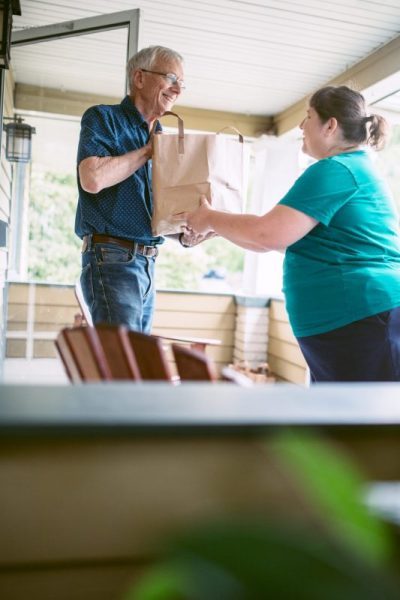How to make long-distance caregiving work
by Jennifer Owens

Caring from a distance
For Xina Eiland, president of a public relations firm in Arlington, Va., the need to get up to speed on her father’s caregiving needs in Detroit began with a phone call and an emergency. Her father, a former engineer at Ford Motor Company, was missing.
He was soon found, disoriented but safe. Still, the episode immediately launched Eiland into a new role as her dad’s caregiver.
From a distance, Eiland quickly put her background in health care administration and professional network to work. She became conservator for her father’s estate. And she set to work answering questions regarding his health insurance and finances.
“I’ve had to make some hard decisions for my father,” she said.
Long-distance caregiving presents very real challenges. There’s no one right way to do it. But as with many aspects of elder caregiving, preparation is key to making it work.
Gather essential info
As the long-distance point of contact for your loved one’s care, there are two main roles: gatherer of info and coordinator of services. What that means: A lot of time on the phone arranging things. You can't be there in person, but you can be responsible for vetting and scheduling service providers, coordinating payments and medical care, and navigating the tricky bureaucracy that comes with elder care.
You need to know what you need to know—and where you can find it—before a crisis hits. To get started, ask your loved one for copies of their important medical, financial and insurance documents.
Next, make a list of phone numbers and emails (for their lawyers, doctors, and pharmacists, among others). Make sure that your name is listed on your parent’s accounts.
The Family Caregiver Alliance’s simple “Where to Find My Important Papers” checklist can help you know what you need to be able to communicate with agencies such as Social Security or the Veterans Administration, as well as banks, lawyers and your parent’s attorneys.
By staying organized, you’ll be able to provide your loved one’s local caregivers the necessary information when it's needed.
Organize legal documents
It's essential to have key legal documents on hand, especially when organizing care from afar. These often include:
- Durable power of attorney, which stays in effect even if your loved one is mentally incapacitated
- Health care surrogate, which allows you to make health care decisions for your loved one if they can’t themselves
- Living will, which details your loved one’s wishes regarding medical treatment
If your loved one hasn’t created these documents yet, now is the time. Without them, you could be forced down the road to have courts make important decisions for you, your family and your loved one.
Make visits count
When you're able to visit, come prepared with questions and a to-do list. Check that bills are being paid on time, the house and car are in good repair, and the fridge is filled.
Talk to neighbors and exchange info. Interview potential caregivers, house cleaners, social workers or other professionals who may be in your parent’s home while you are away. If you can, sit in on a regular medical appointment.
Eiland, for one, travels home to Detroit regularly: “I take care of his medications. I make sure his doctors’ appointments are made. I spend time with him.”
Enlist an on-the-ground team
You can't be there when you're not. But you can make sure somebody is keeping tabs on your loved one. Build a local caregiving team through friends, family, community resources and paid professionals.
Then keep them informed through a simple email group. Or use an online scheduling tool like Lotsa Helping Hands to coordinate visits and volunteers.
Trust your gut
How can a long-distance caregiver know when volunteers aren’t enough and it’s time to bring in or add more outside care? The simple answer, says Doris Haas, RN, a certified geriatric care manager, is when a visit home prompts the first pangs of concern that things aren’t quite right.
Haas suggests asking your loved one questions she can’t fake the answers to to get a read on how forgetful she might be getting. Avoid questions that can be answered with a simple yes or no. Instead of, "Did Joe call you?" ask, "What did Joe say when he called?"
“If you think it’s happening, it’s usually worse than you think it is,” says Haas, owner of Atlas Care Management & Eldercare Mediation, based in Broward County, Fla. “People will try to minimize [their needs].”
That’s when a social worker or geriatric care manager like Haas can be invited to do a comprehensive assessment. They'll evaluate your loved one’s mental and physical health. And they'll look at their home safety, fall risk, financial and social situation to judge whether they’ve become isolated from friends and family.
“[Your mom] could flatly refuse,” says Haas. You can say, ‘I’m worried about you,’and hope she’ll do it for your sake.” But your parent is still in charge of their own life and you may just have to accept it.
Know that you will need extra help
Eventually, stresses Haas, all caregivers, local or long distance, will need additional help with their loved one. The question is what help you need and what your options are for getting that help, Haas says.
You want to make the best choices for your parent and for their situation. But remember to consider their desires: What do they want?
Such questions are central in figuring out the best future for your loved one.
Make time for your relationship
Even as a busy long-distance caregiver, there is one more important task to keep on your to-do list: Have a little fun with your loved one. Set aside time to go out to eat, go to the movies or even invite her friends over for a potluck dinner. Make time to enjoy each other’s company and you’ll both feel better.
Community
Did you know that there are local agencies in every community to help you find the services you need?
Use the search feature, then input your zip code to find local help.
Two popular areas of need for caregivers:
More helpful links:
- Eldercare Locator www.eldercare.gov
- The National Clearinghouse for Long-term Care Information www.longtermcare.gov
- Medicare www.medicare.gov
- Social Security Administration www.socialsecurity.gov
- Veterans Administration www.caregiver.va.gov


4 ways to be closer when you're not
- Parent getting forgetful about doctor's orders? Have them take a digital recorder along to appointments so you can listen later.
- Make a plan for how you or someone else can get into your loved one's home in an emergency.
- Get to know neighbors who will notice — and let you know if something seems amiss.
- Embrace video calling apps like Skype or FaceTime for a closer view from afar.

